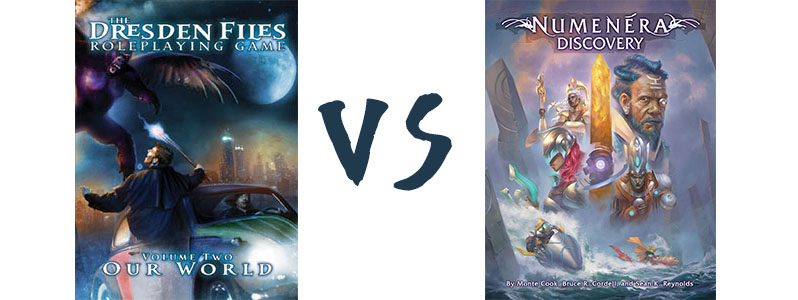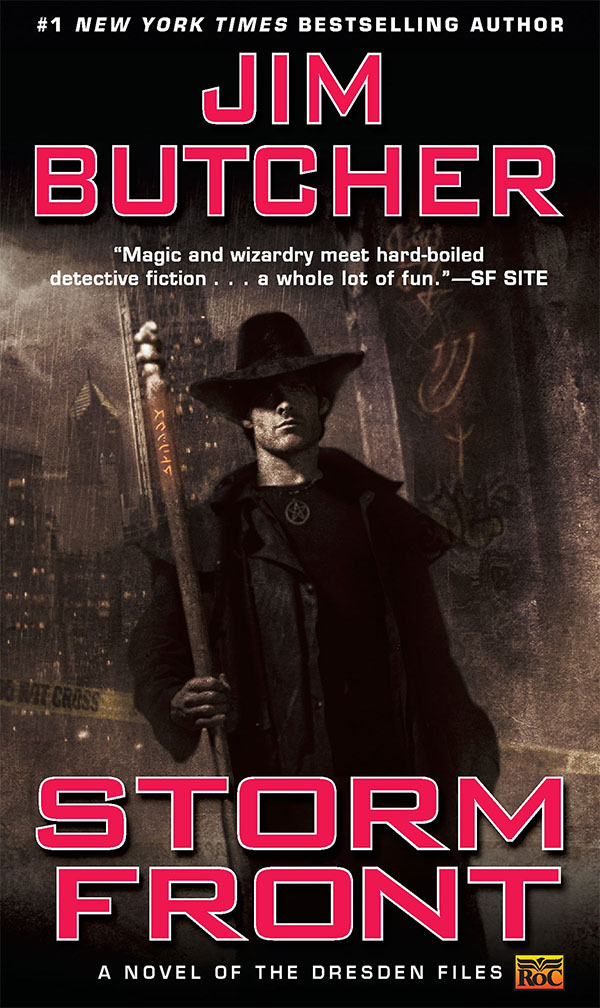
I’ve talked about Numenera and the Cypher System it spawned quite a bit in the past, both here on the Alexandrian and elsewhere. Often what I’m talking about are the GM intrusions, which are one of the best and most innovative elements of the system.
When saying that intrusions are innovative, however, I’m not infrequently confronted by people demanding stuff like, “Have you ever read any Fate game at all?” It’s an ironic comment because it’s an accusation of ignorance which is, in fact, born from ignorance. But it’s happened often enough that I feel a need to just write up a definitive explanation that I can reference in the future.
First: Yes, I’m familiar with and have played (and run) Fate.
Second: Yes, both games feature a mechanic in which the GM offers a point of meta-currency to a player to achieve an effect which the player can cancel by spending their own meta-currency. But the similarity is superficial, in much the same way that saying “in Magic: The Gathering you play cards from your hand and in Dominion you also play cards from your hand” is a superficial comparison of those games.
Let’s break this down.
GM INTRUSIONS
I discuss the GM intrusions of the Cypher System in much more detail in The Art of GM Intrusions, but the short version is that the function of a GM intrusion is for the GM to say, “I’m going to do something that the rules don’t normally allow me to do.”
GMs will, of course, do this from time to time in any system. But there’s generally a limit. For example, if a GM’s response to a successful attack in a typical RPG was to say, “Yeah! And you hit the mammoth-saur so hard that your axe actually gets stuck in its side! And then it rears back and rips the axe right out of hands!” the players would generally say (or at least think), “This is bullshit.” Because punishing people for making a successful attack is bullshit; it’s a violation of the rules we’ve all agreed to abide by.
But hitting something so hard that your weapon gets stuck in it is actually pretty fucking badass. And what the GM intrusion mechanics basically let the GM say is, “Wouldn’t this be cool?” (by offering XP) and for the players to say, “Fuck yeah!” (by accepting the XP) or “No, I don’t think so,” (by spending an XP to cancel the intrusion) within the rules we’ve all agreed to abide by.
We could, of course, just chat this out without the mechanic, but (a) you can really say that about any mechanic in an RPG and (b) in practice, making it an explicit mechanic lubricates the interaction so that play doesn’t bog down on these points.
This simultaneously lets Monte Cook, the designer, keep the system streamlined by binning all the special case rules. The example he gives in the book basically boils down to, “The reason other games have attack of opportunity rules is to eliminate weird edge cases where turn-based combat creates odd and undesirable outcomes like being unable to stop someone from running past you because it’s not your turn. Instead of having a whole heap of special case rules trying to weed out those corner cases, the GM should just use the intrusion mechanic to deal with them when and if they’re important.”
Basically, any time the rules would discourage something awesome from happening or result in one of these weird edge cases due to their streamlined abstraction, the GM instrusion provides a mechanism for resolving it.
FATE COMPELS
Let’s compare this to Fate in which the GM can identify a specific Aspect belonging to a character and compel it by paying a Fate Point to the player. (And the player, in turn, can cancel the compel by instead spending a Fate Point of their own.)
As we’ve noted, the form of the mechanic is superficially similar. But the function of the mechanic has a completely different feature set.
I’ve been spending a lot of time with the Dresden Files RPG lately, so we’ll use that as our primary example. It includes two types of compels: Limitations and Complications. Limitations are the GM forcing the player to take a specific type of action (which, you’ll note, is not something that GM intrusions do at all). Complications are similar to one variety of GM intrusion (by introducing elements that are disadvantageous to the PCs during play), but note how the actual execution of the mechanic is almost completely inverted: Compelling an Aspect isn’t providing mechanical support for unanticipated edge cases; they’re explicitly the core rule by which Aspects (which are one of the primary ways of describing your character mechanically) are mechanically implemented.
Here’s one way to clearly perceive the distinction: If you took GM intrusions out of the Cypher System, nothing on your character sheet would change. If you took compels out of Fate, you’d have a whole bunch of negative-leaning Aspects on your character sheet without any mechanical hook for using them.
WHY DOES THIS MATTER?
Because the misapprehension that GM intrusions are supposed to be used like compels in Fate appears to be causing a lot of Fate players to misuse and dismiss one of the most useful innovations in RPG design in the last decade.
If you believe that GM intrusions are just “watered down compels from Fate” (as one Fate player told me), it means that you’re not only limiting your use of GM intrusions to one very tiny part of what they’re capable of, you’re also saddling the GM intrusion mechanic with an entire ethos (being the primary mechanism for leveraging character traits into play) which GM intrusions are not mechanically capable of robustly supporting (because, again, that’s not what they’re designed to do).
The opposite, of course, would also be true: If you tried to use Fate compels as if they were GM intrusions, the result would almost certainly be a very sub-optimal use of the Fate system. However, I don’t think I’ve ever seen this in actual play or online discussions, which is why my discussion here is primarily focused in the opposite direction.












